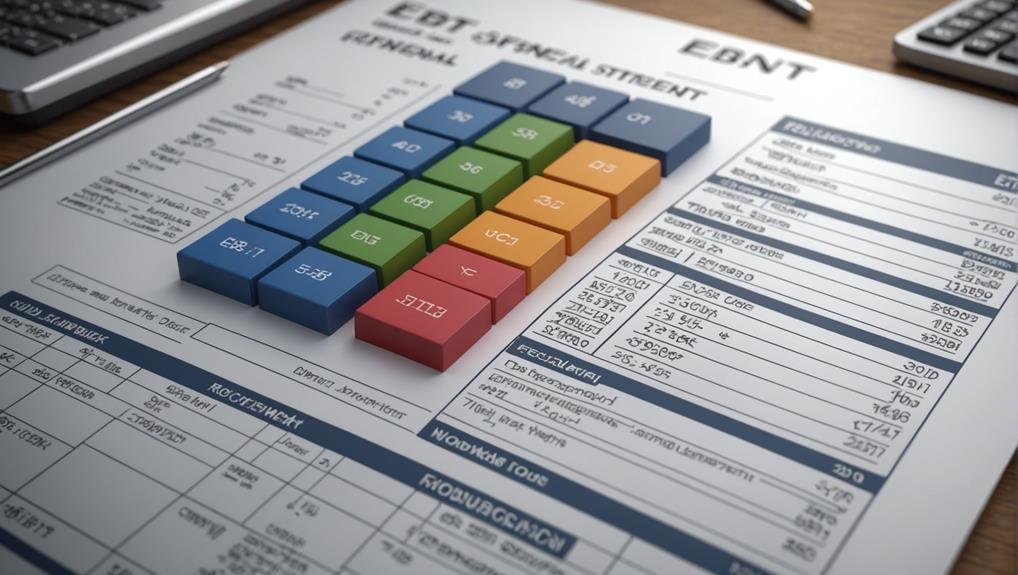Earnings Before Interest and Taxes (EBIT): Formula and Example
Understanding Earnings Before Interest and Taxes (EBIT) is essential for evaluating a company's operating profitability. EBIT excludes interest and taxes, focusing solely on the core business performance. The formula for EBIT helps in evaluating operational efficiency and making informed financial decisions. By analyzing EBIT, investors gain insights into the company's ability to generate profits from its core operations. This understanding is fundamental in comparing companies and gauging their financial health accurately. For a detailed explanation and example of EBIT calculation, navigate to further sections.
Key Takeaways
- EBIT formula: Revenue minus operating expenses equals EBIT.
- EBIT excludes interest and taxes for operational insight.
- EBIT helps assess core profitability before financial obligations.
- EBIT example: Revenue $100,000, expenses $50,000, EBIT $50,000.
- EBIT aids in evaluating operational efficiency for strategic decisions.
Understanding EBIT in Financial Analysis
How does EBIT serve as a pivotal metric in financial analysis, offering insights into a company's operational profitability and efficiency?
EBIT analysis explores a company's financial performance by focusing solely on its operating profitability. This metric strips away the impact of interest and taxes, providing a clear view of how well a company's core operations are generating profits.
By excluding these financial factors, EBIT allows investors and analysts to evaluate a company's operational efficiency without the distortion caused by financing and tax decisions. Understanding EBIT is essential for accurately gauging a company's ability to generate earnings, manage debts, and sustain its operations.
In financial analysis, EBIT plays a critical role in comparing companies' operational strengths and guiding strategic decision-making.
Significance of EBIT Calculation
The calculation of Earnings Before Interest and Taxes (EBIT) holds significant importance in financial analysis due to its focus on a company's core operational profitability. EBIT analysis provides a clear understanding of a firm's operating efficiency by excluding the impact of financing and tax decisions. It allows investors to evaluate operational performance accurately, facilitating comparisons with peer companies.
Difference Between EBIT and EBITDA
When comparing EBIT and EBITDA, a fundamental distinction lies in their treatment of depreciation and amortization expenses.
- EBIT excludes interest and taxes, focusing solely on operational profitability.
- EBITDA includes depreciation and amortization, providing a broader view of financial metrics.
- Depreciation impacts net income but is excluded from EBITDA, offering insights into operational efficiency.
Understanding these differences is vital for evaluating a company's financial health and operational strengths accurately. Both EBIT and EBITDA play essential roles in financial analysis, each offering unique perspectives on a company's profitability and performance.
EBIT Formula Explained
An essential calculation in financial analysis, the EBIT formula, denoting Earnings Before Interest and Taxes, serves as a key metric for evaluating a company's operational profitability. EBIT profitability analysis focuses solely on the core operational performance by excluding interest and taxes from the equation. This metric provides a clear view of a company's ability to generate profit before considering financial obligations and tax issues.
Importance of EBIT for Investors
Pivoting from the discussion on the EBIT formula, the significance of EBIT for investors lies in its ability to provide a clear assessment of a company's operational profitability without the influence of interest and taxes.
- Investor insights: EBIT helps investors understand the core profitability of a company's operations, enabling better financial analysis.
- Market implications: EBIT allows for a more accurate comparison of companies' operational strengths, aiding investors in making informed investment decisions.
- Strategic decision-making: EBIT guides investors in evaluating a company's operational efficiency, assisting in strategic decision-making processes.
Calculating EBIT: Step-by-Step Guide
To calculate Earnings Before Interest and Taxes (EBIT), start by subtracting a company's operating expenses from its total revenue. This step provides a thorough insight into the company's operational profitability before considering interest and taxes.
Once EBIT is derived, further analysis can be conducted, such as EBIT margin analysis to assess the proportion of revenue that translates into EBIT. Additionally, EBIT sensitivity analysis can be performed to understand how changes in revenue or expenses impact EBIT.
Application of EBIT in Real Scenarios
The practical implementation of EBIT analysis in real business scenarios showcases its effectiveness in evaluating operational efficiency and financial performance.
- EBIT aids in comparing operational strengths in the real world.
- EBIT provides a clear view of core operations in practical applications.
- EBIT guides strategic decision-making based on financial performance metrics.
These real-world applications demonstrate how EBIT is a valuable tool for appraising a company's operational performance and financial health accurately. By focusing on core operations and excluding non-operating factors, EBIT enables investors and analysts to make informed decisions regarding a company's profitability and efficiency.
Conclusion
In summary, EBIT serves as an essential measure of a company's operational performance and profitability, providing valuable insights for investors and analysts. By excluding the impact of taxes and interest expenses, EBIT offers a clear view of a firm's ability to generate earnings from its core business activities.
Its calculation and application play a significant role in financial analysis, guiding strategic decision-making and facilitating comparisons across industry peers.
EBIT, a beacon of operational efficiency and profitability in the financial domain.







